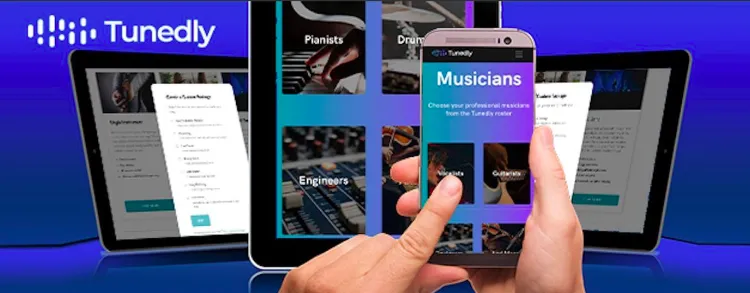The first song for the year will be released in February. “Rest In My Shadow” is written by Troy Raymond, and re-recorded by The Voice finalist Ryan Whyte.
Tunedly, a company that first splashed onto the scene with a decentralized music recording and collaboration concept is now seeing serious traction on its unconventional ‘Masked Music Discovery Platform.’
Tunedly’s decentralized platform for recording music involves a network of studio pros and musicians. The company’s roster of session musicians has made it easier for artists to assemble teams and dramatically lower the cost of recording music. Tunedly estimates that Rihanna spends roughly $50,000 to record a hit song, while an artist using Tunedly can slash that cost by more than 90%.
Beyond the recording and studio platform, Tunedly has been spending the past few months expanding its ‘Masked Music Discovery Platform,’ which aims to put songwriters and performers on an equal playing field with seasoned musicians.
In a nutshell, the discovery platform ‘masks’ non-musical elements like the artist’s name and image to avoid selection bias and help lesser-known indies and unsigned artists receive a more authentic evaluation. DMN first joined forces with Tunedly last year to further accelerate this fast-growing concept.
Chris Erhardt, Tunedly’s CEO and cofounder, told DMN that the goal is to isolate great songwriting and artists by stripping out the fluff of celebrity names and promotional hype. “The problem with existing music discovery services is that they replicate existing inequalities in the music industry,” Erhardt said. “Unsigned artists are at a disadvantage because it’s not a true level playing field, and they are judged on more than just their music.”
The platform analyzes listener stats and streaming patterns, unlocking opportunities for audience favorites to earn lucrative publishing deals with Tunedly in partnership with Spirit Music Group.
Tunedly also rewards listeners for their role in selecting winning songs — making artist success a community project.
Listeners can earn TunedCoin (TUC), Tunedly’s native crypto token. The ability to earn TunedCoin while they discover and rate music facilitates a community aspect, ultimately allowing deserving artists the opportunity to acquire a publishing deal.
For listeners, signing up for Tunedly is free of charge. The platform notes their genre of choice, and every listener receives one ‘star’ per day to place on any song they believe has the potential to become a hit.
Tunedly’s algorithm tracks a range of usage stats, including listener metrics like stars given to songs, number of skips, and average listening duration, among other metrics. That data allows Tunedly’s A&R team to sift through thousands of tracks and judge which songs have the most potential. A community-selected track can ultimately bubble into a publishing deal with Tunedly in cooperation with Spirit Music Group.
Other perks also await participants. If a listener gives their star to a song that ends up receiving a publishing deal, they obtain that song’s NFT. Moreover, the first 1,000 listeners who initially awarded their star to that winning song will receive 1 TunedCoin each.
Apart from TunedCoin bringing access to exclusive events, every listener who owns that song’s NFT and TunedCoins is eligible to receive a split of royalties from that song, facilitated by Tunedly’s TunedCoin project.
The more TunedCoin a listener owns, the higher their share of Tunedly royalties. This blockchain-fueled reward mechanism encourages user engagement and has drawn the attention of artists, publishers, agents, managers, and more. The platform is a way to involve music fans and enhance the perceived value of music, which Erhardt says has been lost with the emergence of unlimited music streaming platforms.
Royalty splits are dictated by individual TunedCoin holdings. As a hypothetical explanation, if Tunedly and one other individual are the sole owners of an NFT of a song, and each owns 100 TunedCoins, a $1,000 royalty will be split as $500 each. However, the following month, if the user acquired an additional 200 TunedCoins and now owns 300 TunedCoins, while Tunedly’s share remains 100 TunedCoins, the $1,000 royalty would be split differently. From the same hypothetical $1,000 royalty, 75% would go to the user (receiving $750), and Tunedly would retain merely 25% ($250).
Tunedly’s inclusion, rewards, and support model is unusual, though the aim is to surface artists that could potentially make waves. As 2023 kicks off, the company is focused on providing lucrative deals to independent musicians and artists who deserve an audience.

